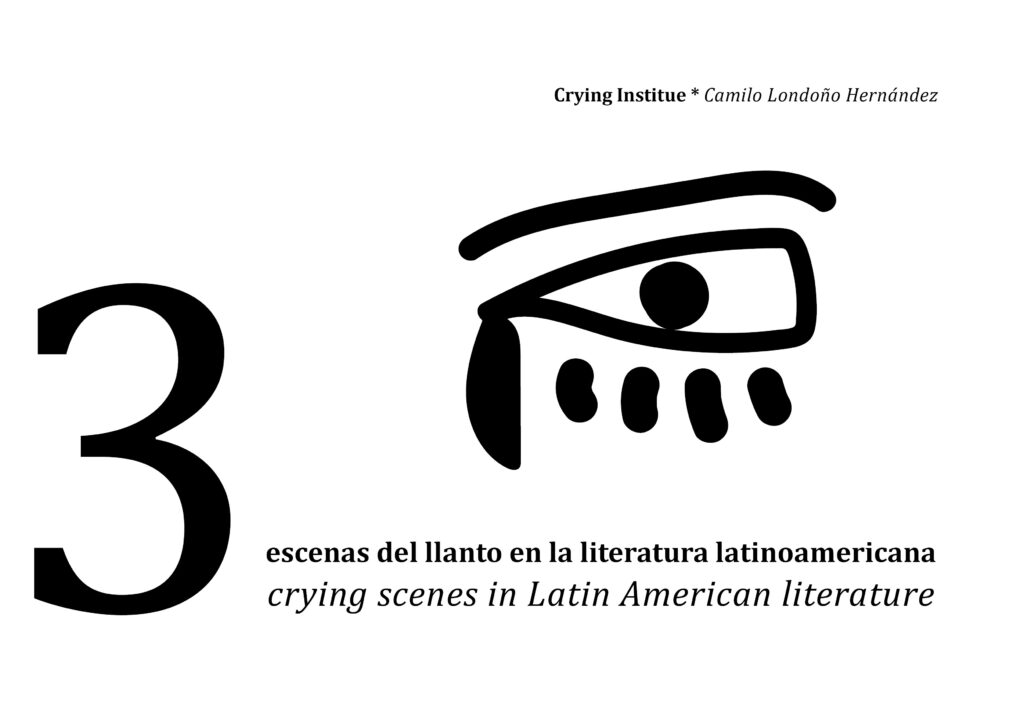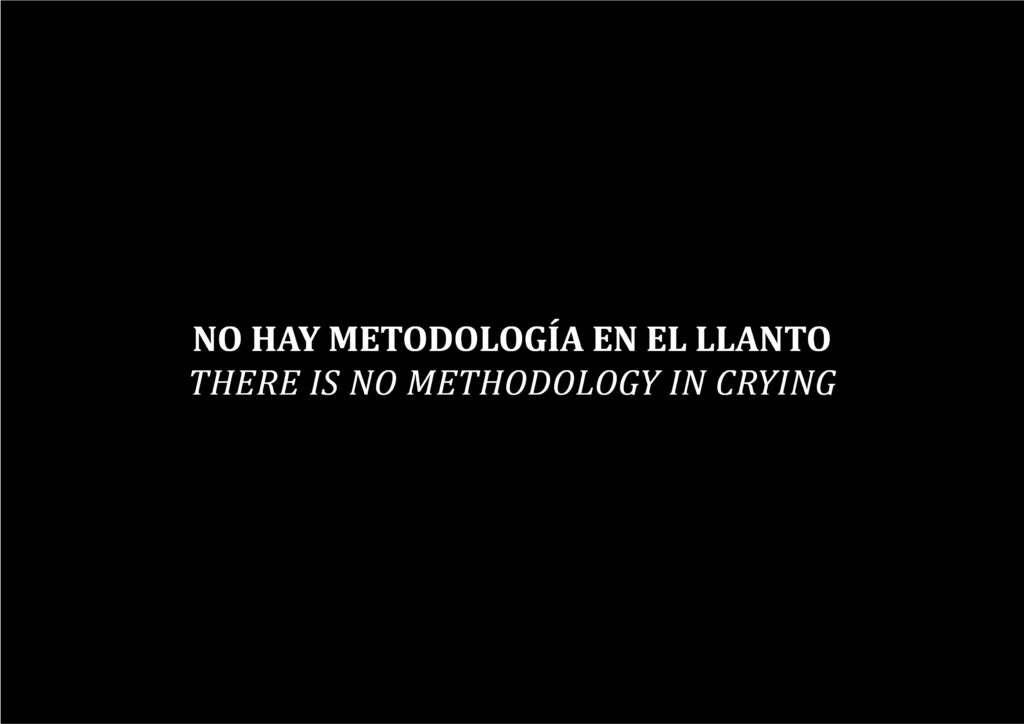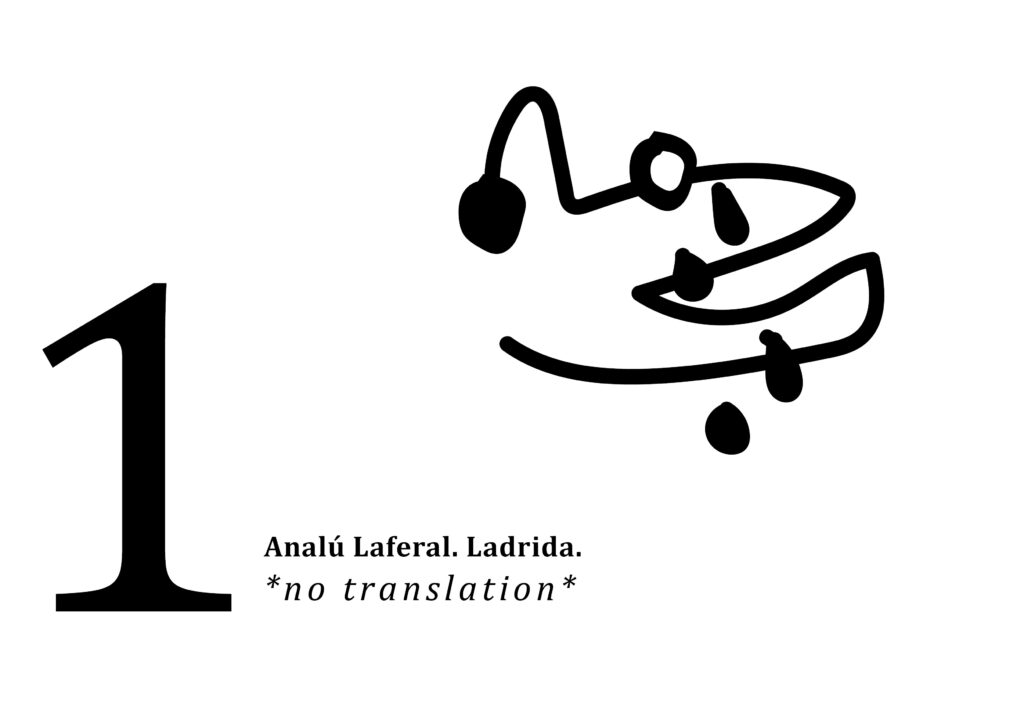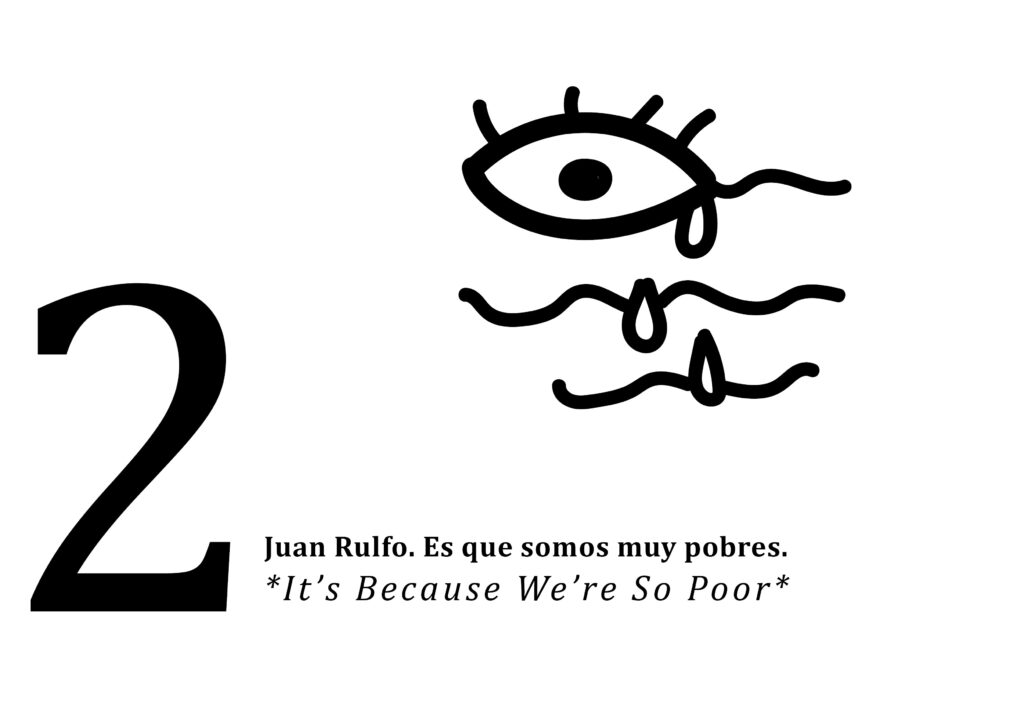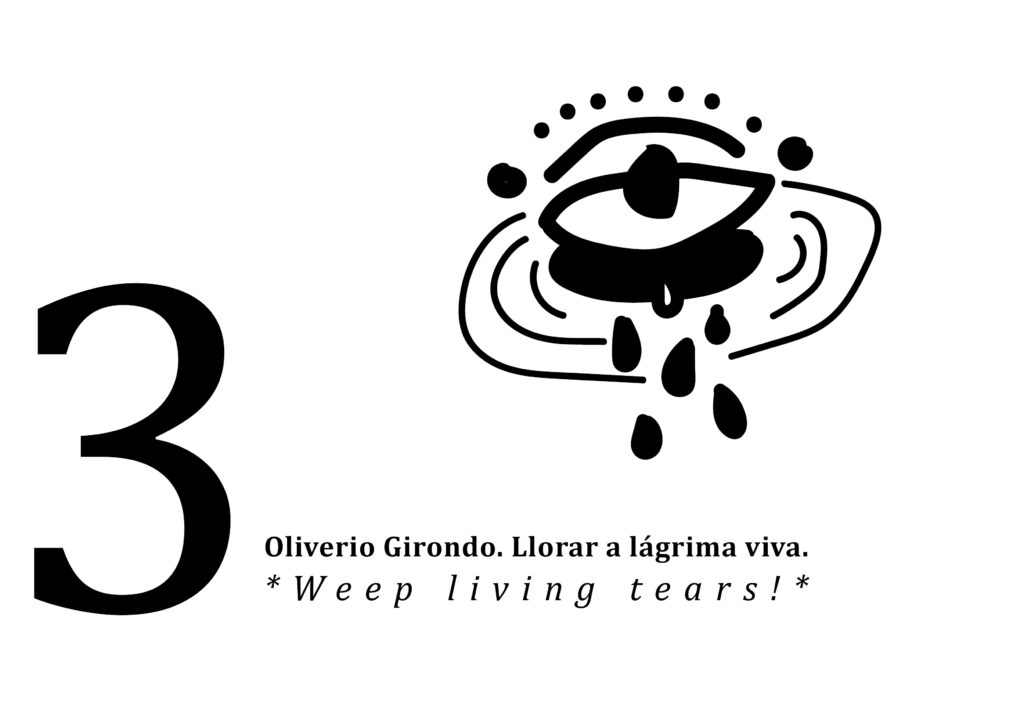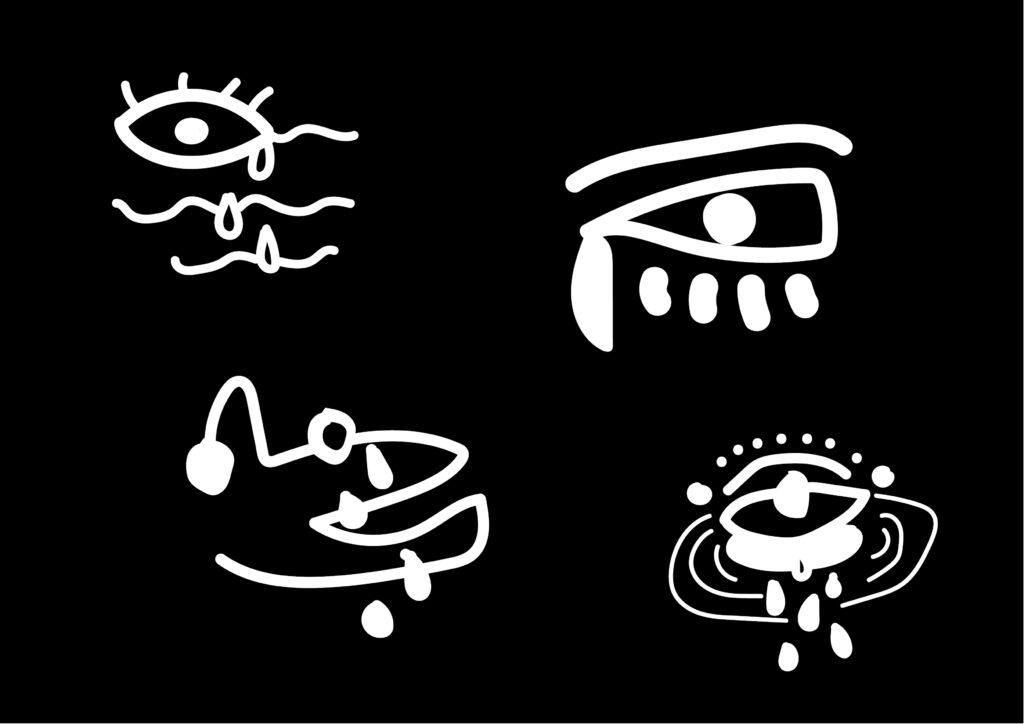A short story and performative reading by Camilo Londoño Hernández
[Spanish]
[Al final todos muertos]
Te matarán. Me matarán. Nos matarán. Me matarás. Me mataste. Os mataréis. Los mataron. Por hijueputas. Por maricas. Por pendejos. Por guerrillos. Por paracos. Por pendejos. Por maricas. Por campesinos. Por ciudadanos. Al final…¡Todos muertos!
Iba vestido de azul oscuro. El buzo y el jean monocromáticos parecían una sola prenda casi un overol de obrero en turno de domingo. Cuando el vidrio del bus le dio reflejo a su rostro se sintió como un cursi poema.
No podía arreglarlo. Tres de la tarde.
Jairo, Jota, su amigo, el muerto, se estaría descomponiendo mientras él pensaba en la mejor ropa que podía llevar a un velorio. Aunque era cierto, su cita no era con Jota; lo que lo esperaba era tan sólo eso: el cuerpo. El cuerpo sudoroso, bañado, agasajado, estirado, moribundo, petrificado, exaltado, muerto, agrio, frío, tibio, cercano, triste, ajeno, en llanto, vacío. El cuerpo de Jairo y los dedos extrañamente redondeados por las uñas, con los nudillos lisos y los huesos gordos, pesados. La columna y esa cicatriz en la espalda baja, como mirando sobre sí, hacia la carne.
-Es de una cirugía.
-¿Hace mucho?
-De niño. No nos conocíamos.
Eso es lo que iba a ver. El cuerpo de su amigo, Jairo, su amante. Las rodillas sucias, los hombros en triángulo, la barriga ancha, los ojos para adentro, tranquilos, pesados, muertos sobre su cuerpo.
Eran la tres de la tarde. Jairo Fernández. Sala 6.
Esculcó el cementerio con la mirada y se adentró en el laberinto de puertas, nombres y ataúdes. Las escalas eran amarillas y las paredes blancas casi grises como huesos en formol. De tanto en tanto, entre las puertas o por los pasillos, pasaban negras manchas de gente, y a veces, por error, alguna mujer anciana se movía con una camisa ancha y florida rompiendo el ritmo solemne de los cuartos de velación.
Sala 6.
A pesar de de ser un espacio pequeño, en ese cuarto se podían encontrar todas las personas con las que un ser humano se puede cruzar en la vida. Desconocía lo popular que llegaría a ser la muerte de su amigo. Se asombró. Respiró con espantosa esperanza y se zambulló entre la masa como un pequeño cuerpo inmerso en otro más grande. Al detallar el ataúd observó que la ventanita que deja ver el rostro de los muertos estaba cerrada. Intentó abrirla pero no pudo. Del tumulto estallaron voces y llantos con sensación a chisme. Las señoras empezaron los rezos confundiéndolas con anécdotas que no correspondían al novenario.
-¡Pobre Jairito, cómo quedó de desfigurado!
-¡Ay mija, es que ahora no respetan nada!
-¡Qué pesar de ese muchacho, con el cuerpo tan bonito que tenía!
En medio de los murmullos pensó que no sabía cómo fue la muerte de Jota. Una amiga en común había dejado un mensaje entrecortado, entre llantos, en el celular. “¡Jueputa!, Jota, lo mataron, lo mataron, a Jairo, ¡a nuestro Jota!”. Él intentó devolverle la llamada, pero no obtuvo respuesta. Solo un mensaje de texto rápido con el nombre del velatorio y la dirección. Y ahora él estaba ahí, vestido con un mal color azul, mirando una caja sin saber por qué.
“Dos cuchilladas en la espalda para volverle a abrir la cicatriz”. “A él lo torturaron agarrándole el pene con pinzas eléctricas”. “Después de robarle y golpearlo, le metieron un revolver en el culo y al disparar, las tripas se expulsaron por el ombligo”. “¡Para que aprenda por… ¡marica!” Seguro Jairo tendría el ano caliente. Ya no tendría más esa cicatriz.
Rozó el cajón con los dedos y desarmó cualquier imagen que sentía sobre los párpados. Sabía que el cuerpo de Jairo estaba ahí y aunque de él sí recordaba cierto calor en la piel, al tocar la madera del cofre sentía un cuerpo frío, ni si quiera tibio, frío como una nube de lluvia o un dulce en el refrigerador.
Un grito cortó el barullo del salón. La madre, como sostenida por el aire, caminó hacia el féretro mientras la habitación se vaciaba. Él también se movió. Ella gritaba como una fruta e podrida que destila jugos amargos. No hubiese imaginado que la madre de Jota luciera así. Para él, aquella máquina de gritos debía ser una señora más alta, más gorda y con menos llanto sobre la lengua. No importaba. Él también le había mentido a Jairo sobre sus padres.
-Viven en el Caribe. Por eso nunca están en la ciudad.
Sin embargo, aquella mujer resultaba siendo lo más familiar que había visto desde que ingresó al cementerio. Su amiga no estaba. Unos compañeros que pensaba encontrarse, tampoco; y el cuerpo, lo único conocido y memorizado para él, lo que motivaba aquella cita, parecía no estar ahí. “Desafortunado encuentro”, pensó sin poder llorar.
Salió a buscar un café y al regresar leyó en la cartelera que se estiraba sobre la puerta del velatorio: “Jairo Hernández. Sala 6”.
Repasó las letras incrédulo.
Jairo Hernández. Fernández. Hernández. Jairo. Jota. Juego. Jugo. Muerte. Coja. Ardor. Sudor. Amor. Canción. Soledad. Calle. Amor. Aquí huele feo. ¿Quieres caminar? Sigamos por aquí. Me duele. Tengo sueño. Vamos a comer. Esta noche no puedo. La otra semana puede ser.
Quiso bostezar, abrir la boca para simular un grito. Pensó en Jairo y se le cerró la mandíbula con un suspiro. Volvió a repasar la escena tétrica que tenía en frente y se quitó el buzo azul para destapar la imagen de una caricatura fluorescente que se estallaba sobre una camiseta blanca. No intentó buscar la verdadera sala de velación, ni llamar a su amiga, ni redimir su cita con el amor ni la muerte. Salió del cementerio con el suéter sobre los hombros y las mangas vacías rebotándole contra la espalda. Caminó hasta el siguiente parque, donde se sentó a esperar que el sol, cansado del día, se hiciera azul.
***
[English]
THE DATE
[In the end all dead]
They will kill you. They will kill me. They will kill us. You will kill me. You will kill me. You will kill each other. They killed them. For motherfuckers. For faggots. By assholes. By guerrillas. By paramilitaries. By assholes. For faggots. For peasants. In the end… All dead!
He was dressed in dark blue. The monochromatic sweater and jeans looked like a single garment, almost like the overalls of a worker on a Sunday shift. When he saw his face reflected in the bus glass, it felt like a corny poem.
He couldn’t fix it. It was three o’clock in the afternoon.
Jairo, Jota, his friend, the dead man, was decomposing, and he was thinking about the best clothes to wear for a funeral. But his date was not with Jota. What awaited him was just that: the body. The sweaty body, bathed, showered, entertained, stretched, dying, petrified, exalted, dead, sour, cold, lukewarm, close, sad, alien, crying, empty. Jairo’s body and fingers were strangely rounded by nails, with smooth knuckles and fat, heavy bones. The spine and that scar on the lower back, as if it looks over itself, toward the flesh.
-It’s from surgery.
-A long time ago?
-I was a child, and we didn’t know each other yet.
That’s what he went to see: the body of his friend, Jairo. His lover and his dirty knees, his triangular shoulders, his thick belly, his inward eyes, quiet, heavy, dead on his body.
It was three o’clock in the afternoon. Jairo Fernandez. Room 6.
He scanned the cemetery with his eyes and entered the labyrinth of doors, names, and coffins. The stairs were yellow, and the walls were white, almost gray, like bones in formaldehyde. In between the doors and along the corridors, crowds dressed in black walked around. Once in a while, by mistake, one old woman moved in an oversize shirt with flowers breaking the solemn rhythm of the wake rooms.
Room 6.
Despite being a small space, in that room, you could find all of the people that one human being could come across in life. He did not know how popular his friend’s death would become. He was amazed. He breathed with frightened hope and plunged into the mass as a small body immersed in a larger one. As he examined the coffin, he noticed that the little window that normally shows the face of the corpse was closed. He tried to open it but could not. From the tumult burst voices and cries that felt like gossip. The ladies began the prayers, confusing them with anecdotes that did not correspond to the novena.
-Poor Jairito, how disfigured he was!
-Oh, my dear, they don’t respect anything now!
-What a pity about that boy, with the beautiful body he had!
In the middle of the murmurs, he realized he didn’t know how Jota’s death happened. One mutual friend had left a broken message, in tears, on his cell phone. “Fuck! Jota! They killed him, they killed him, they killed him! They killed Jairo, our Jota!” He tried to call her back but got no answer, just a quick text message with the name of the cemetery and the address instead. And now he was there, dressed in an ugly blue, staring at a box without knowing why.
“Two stabs in the back to reopen his scar.” “They tortured him by grabbing his penis with electric pliers.” “After robbing and beating him, they stuck a revolver up his ass and when they fired, the guts were expelled through his belly button.” “So that’s how he learns … faggot!” Surely, Jairo would have a warm anus. He wouldn’t have that scar anymore.
He brushed the drawer with his fingers and erased whatever image he felt on his eyelids. He knew Jairo’s body was there. Although he remembered a certain warmth on his skin when he touched the coffin’s wood, he felt a cold body, not even warm, cold like a rain cloud or a candy bar in the fridge.
A scream cut through the hubbub of the room. The mother, as if held by the air, walked towards the coffin as the room emptied. He also moved. She screamed like a rotten fruit that exudes bitter juices. He would not have imagined that Jota’s mother looked like that. To him, that screaming machine must have been a taller, fatter lady with less crying on her tongue. It didn’t matter. He had lied to Jairo about his parents, too.
-They live in the Caribbean. That’s why they are never in town.
However, that woman was the most familiar thing he had seen since he entered the cemetery. Her friend was not there. And the body, the only thing known and memorized to him, the reason for the meeting, did not seem to be there. “Unfortunate encounter,” he thought without being able to cry.
He went out to get a coffee. When he returned to the room of the wake, he read the sign stretched over the door: “Jairo Hernandez. Room 6”.
He went over the letters in disbelief.
Jairo Hernández. Fernández. Hernández. Jairo. Jota. Game. Juice. Death. Lame. Burning. Sweat. Love. Song. Loneliness. Street. Love. It smells bad in here. Do you want to walk? Let’s go this way. It hurts. I’m sleepy. Let’s eat. I can’t tonight. Maybe next week.
He wanted to yawn to open his mouth and simulate a scream. He thought of Jairo. He closed his jaw with a sigh. He went back over the gloomy scene in front of him and took off his blue sweater. An image of a fluorescent cartoon exploding on a white T-shirt was uncovered. He didn’t try to find the real wake room, call his friend, or attend his date with love and death. He left the cemetery with the sweater over his shoulders and the empty sleeves bouncing against his back. He walked to the next park. There, he sat waiting for the day-weary sun to turn blue.
